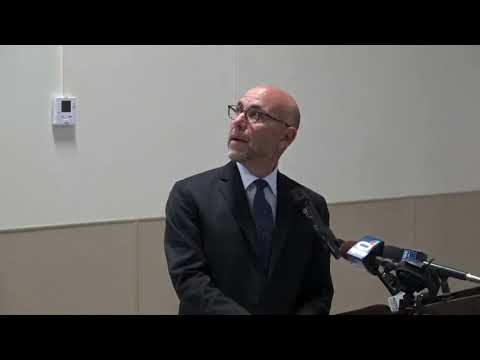Results from Rhode Island Food Bank’s 2019 Hunger Survey paint a picture of desperate families and hungry children
“The results of the survey provide a portrait of the people served by the Food Bank,” said Rhode Island Community Food Bank CEO Andrew Schiff. “They’re children, seniors, and the working poor. They live in poverty, face hardships, and make difficult financial choices, and they suffer from poor health. Many are enrolled in SNAP, but they also rely on food
October 10, 2019, 12:17 pm
By Steve Ahlquist
“The results of the survey provide a portrait of the people served by the Food Bank,” said Rhode Island Community Food Bank CEO Andrew Schiff. “They’re children, seniors, and the working poor. They live in poverty, face hardships, and make difficult financial choices, and they suffer from poor health. Many are enrolled in SNAP, but they also rely on food pantries and meal programs because SNAP benefit alone are not adequate.”
“The people most vulnerable to the harmful effects of hunger are children and senior adults,” said Rhode Island Community Food Bank CEO Andrew Schiff, summarizing the results of the 2019 Hunger Survey, created in collaboration with the Hassenfeld Child Health Innovation Institute at Brown University. “Among households served at food pantries, two-thirds have at least one child under age 18, or a senior over the age of 65.
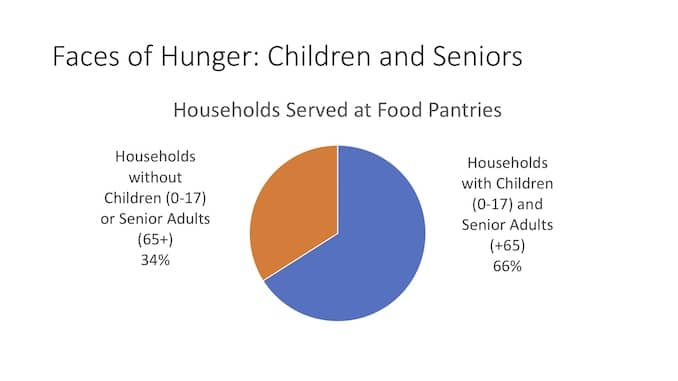
“One of the consequences of hunger,” continued Schiff, “is poor health. We know that hunger is a health issue but we were surprised to find that 45 percent of respondents have fair or poor health, as compared to good, very good or excellent health. 41 percent of households have a member with diabetes, 60 percent have a member with hypertension.”
To put that in context, the prevalence of diabetes in Rhode Island is about nine percent. The prevalence of hypertension in the United States is about 30 percent. “Simply put,” said Schiff, “hunger takes a toll on people’s health.
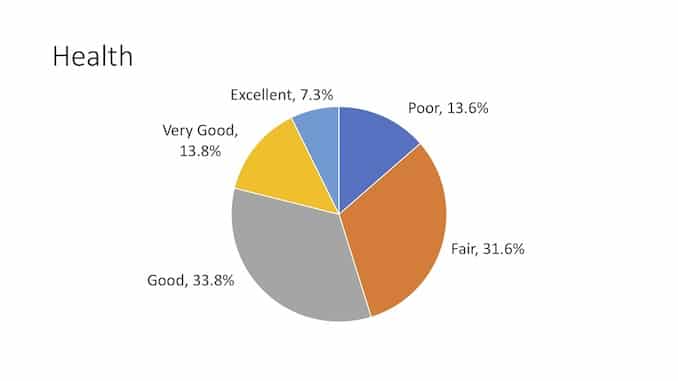
“88 percent of households had an income below the federal poverty level. And yet, 69 percent of household have an adult with children who was employed in the last year. Even though they’re working, they are not earning enough to advance out of poverty.
“Imagine being a parent with two kids, earning less than $2000 a month, and having to find a two-bedroom apartment for your family, afford all the bills and also be able to pay for food. It’s not possible.”
These families, said Schiff, “are left with tough choices. Over 30 percent of households had to choose at some point in the last year between purchasing food or paying for another basic household expense, rent, utilities, putting gas in the car, [or] healthcare. Close to half reported borrowing money from a friend or family member.”
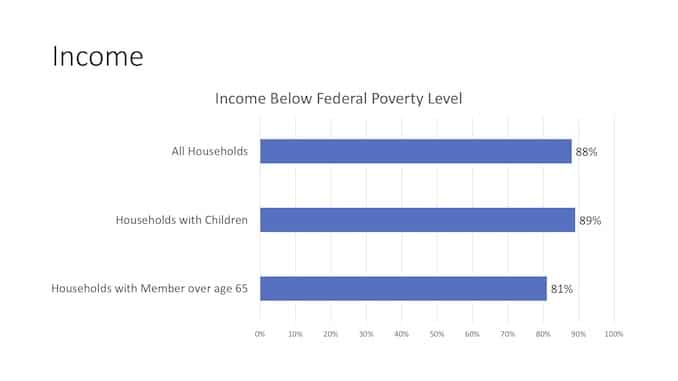
Many of the parents interviewed for the survey were working, said Schiff. “We asked folks who were unemployed and not working how come they weren’t working. 23 percent were retired, so this is the older population that we serve, but 63 percent said that they were not working due to poor health or disability.”
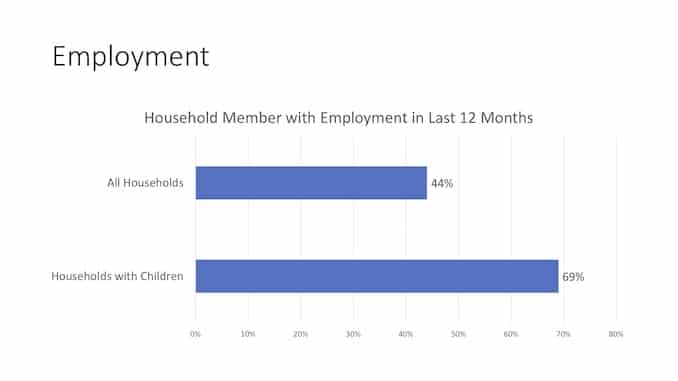
“75 percent of the households served by the Food Bank are enrolled in SNAP. The USDA is proposing major changes to SNAP that will reduce benefits and cut eligibility. If enacted, these changes will take SNAP benefits away from individual adults in Rhode Island and families with children, increasing the demand for food pantries and meal programs.”
Putting all this information into context, Schiff reported that, “In September the USDA reported that 11 percent of households in Rhode Island are food insecure. That means they cannot afford adequate food. Nearly half of those households that reported food insecurity reported the most severe conditions, skipping meals, not eating for an entire day, going hungry.”
So how do these households cope? How do they manage? “We asked people about the difficult decisions they make, what we call trade-offs,” said Schiff.
“For households with children, 51 percent had to choose between paying the utility bill or buying food at some point in the last year. 46 percent had to choose between paying the rent and buying food. 39 percent had to choose between paying for transportation or food. Many resorted to borrowing money. Almost half had to borrow money from a friend or family member. 33 percent carried debt on a credit card or loan. 30 percent had unpaid medical bills.

“The survey,” said Schiff, “is showing us a picture of individuals and families that are squeezed between the high cost of living in Rhode Island and limited income and resources.
“On of their biggest expenses is rent. Just nine percent of the people we surveyed were homeless or in temporary housing. Homelessness is a very serious problem in Rhode Island, but the vast majority of people served by the food bank have permanent shelter. Most live in an apartment and pay rent. It’s permanent, technically, but it’s not always stable housing.
“Ten percent of those surveyed reported eviction or foreclosure in the last five years, the most disruptive events for any household.”
In addition to food pantries and meal programs, government nutrition programs like WIC, SNAP and school meals are vitally important. “75 percent of the households that we talked to wee enrolled in SNAP,” said Schiff. “But the SNAP households told us that their benefits were not adequate. Most use up their benefits within two weeks, and then turn to food pantries to feed their families.
“Low income households need higher SNAP benefits. But the USDA is proposing just the opposite, proposing to cut SNAP. Under one proposal, 11,000 Rhode Islanders would lose their benefits entirely, including 5,000 children. This is despite the fact that Congress approved the Farm Bill last year, in which they secured SNAP benefits at current levels with bipartisan support.”
“Finally, the survey asked about citizenship,” said Schiff. “Almost everybody surveyed was a citizen or permanent legal resident.”
Schiff is concerned about these numbers, because “we know that people who are in the process of applying for a green card are avoiding government services [because] they are afraid that will affect their road to citizenship. What we’re concerned about is that it’s also leading people to not seek our help at food pantries and meal programs.”
Accessing meals at food pantries and meal programs will not affect and potential bid for citizenship or legal residence in the United States.
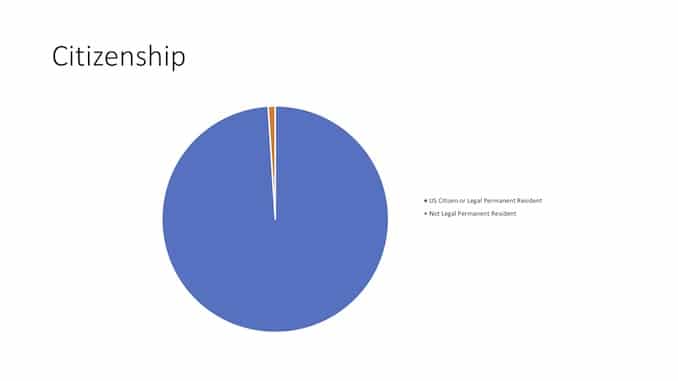
“The results of the survey provide a portrait of the people served by the Food Bank,” concluded Schiff. “They’re children, seniors, and the working poor. They live in poverty, face hardships, and make difficult financial choices, and they suffer from poor health. Many are enrolled in SNAP, but they also rely on food pantries and meal programs because SNAP benefit alone are not adequate.”
UpriseRI is entirely supported by donations and advertising. Every little bit helps:
Become a Patron!




